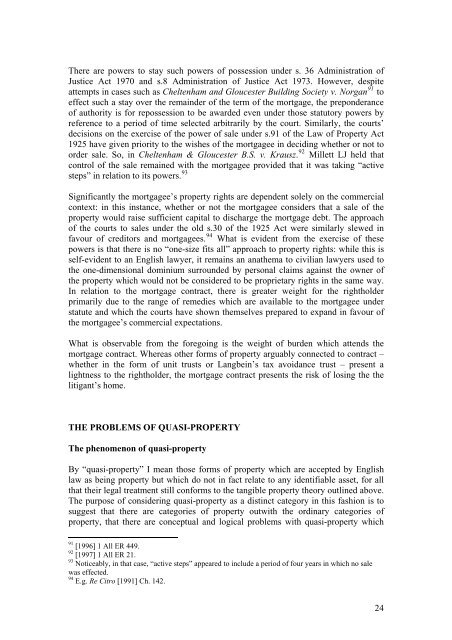The Unbearable Lightness of Property - alastairhudson.com
The Unbearable Lightness of Property - alastairhudson.com
The Unbearable Lightness of Property - alastairhudson.com
Create successful ePaper yourself
Turn your PDF publications into a flip-book with our unique Google optimized e-Paper software.
<strong>The</strong>re are powers to stay such powers <strong>of</strong> possession under s. 36 Administration <strong>of</strong><br />
Justice Act 1970 and s.8 Administration <strong>of</strong> Justice Act 1973. However, despite<br />
attempts in cases such as Cheltenham and Gloucester Building Society v. Norgan 91 to<br />
effect such a stay over the remainder <strong>of</strong> the term <strong>of</strong> the mortgage, the preponderance<br />
<strong>of</strong> authority is for repossession to be awarded even under those statutory powers by<br />
reference to a period <strong>of</strong> time selected arbitrarily by the court. Similarly, the courts’<br />
decisions on the exercise <strong>of</strong> the power <strong>of</strong> sale under s.91 <strong>of</strong> the Law <strong>of</strong> <strong>Property</strong> Act<br />
1925 have given priority to the wishes <strong>of</strong> the mortgagee in deciding whether or not to<br />
order sale. So, in Cheltenham & Gloucester B.S. v. Krausz. 92 Millett LJ held that<br />
control <strong>of</strong> the sale remained with the mortgagee provided that it was taking “active<br />
steps” in relation to its powers. 93<br />
Significantly the mortgagee’s property rights are dependent solely on the <strong>com</strong>mercial<br />
context: in this instance, whether or not the mortgagee considers that a sale <strong>of</strong> the<br />
property would raise sufficient capital to discharge the mortgage debt. <strong>The</strong> approach<br />
<strong>of</strong> the courts to sales under the old s.30 <strong>of</strong> the 1925 Act were similarly slewed in<br />
favour <strong>of</strong> creditors and mortgagees. 94 What is evident from the exercise <strong>of</strong> these<br />
powers is that there is no “one-size fits all” approach to property rights: while this is<br />
self-evident to an English lawyer, it remains an anathema to civilian lawyers used to<br />
the one-dimensional dominium surrounded by personal claims against the owner <strong>of</strong><br />
the property which would not be considered to be proprietary rights in the same way.<br />
In relation to the mortgage contract, there is greater weight for the rightholder<br />
primarily due to the range <strong>of</strong> remedies which are available to the mortgagee under<br />
statute and which the courts have shown themselves prepared to expand in favour <strong>of</strong><br />
the mortgagee’s <strong>com</strong>mercial expectations.<br />
What is observable from the foregoing is the weight <strong>of</strong> burden which attends the<br />
mortgage contract. Whereas other forms <strong>of</strong> property arguably connected to contract –<br />
whether in the form <strong>of</strong> unit trusts or Langbein’s tax avoidance trust – present a<br />
lightness to the rightholder, the mortgage contract presents the risk <strong>of</strong> losing the the<br />
litigant’s home.<br />
THE PROBLEMS OF QUASI-PROPERTY<br />
<strong>The</strong> phenomenon <strong>of</strong> quasi-property<br />
By “quasi-property” I mean those forms <strong>of</strong> property which are accepted by English<br />
law as being property but which do not in fact relate to any identifiable asset, for all<br />
that their legal treatment still conforms to the tangible property theory outlined above.<br />
<strong>The</strong> purpose <strong>of</strong> considering quasi-property as a distinct category in this fashion is to<br />
suggest that there are categories <strong>of</strong> property outwith the ordinary categories <strong>of</strong><br />
property, that there are conceptual and logical problems with quasi-property which<br />
91 [1996] 1 All ER 449.<br />
92 [1997] 1 All ER 21.<br />
93 Noticeably, in that case, “active steps” appeared to include a period <strong>of</strong> four years in which no sale<br />
was effected.<br />
94 E.g. Re Citro [1991] Ch. 142.<br />
24













